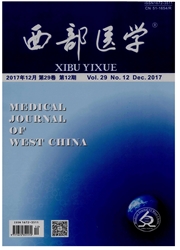

 中文摘要:
中文摘要:
目的探讨姑息治疗的肺癌患者创伤后成长的影响因素,为临床姑息治疗肺癌提供有效可靠的参考依据。方法选择2013年7月~2014年5月我院呼吸内科收治的107例姑息治疗的肺癌患者为研究对象,采用一般资料调查及创伤后成长评定量表(PTGI)、心理弹性问卷(C13-RISC)、癌症疲乏量表(CFS)对患者进行调查。采用Peason相关系数和Spearrnan秩相关系数分析对PTGI评分与各指标进行相关性分析。结果PTGI评分中,除人际关系外,PTGI低分组其余各维度均低于高分组(均P〈0.05)。PTGI低分组CD-RISC各维度均低于PTGI高分组,CFS各维度均高于PTGI高分组,差异均有统计学意义(均P〈0.05)。相关性分析结果显示,PTGI评分与家庭个人月均收入、医疗费用来源、坚韧性、力量、乐观性呈正相关(均P〈005);与躯体疲乏、认知疲乏、情感疲乏呈负相关(均p〈0.05)。结论姑息治疗的肺癌患者创伤后成长受患者的收入、医疗费用来源、心理弹性程度、癌症疲乏程度影响,社会应给予一定的关注和支持,医护人员可从心理及加强护理角度提高患者的创伤后成长,进而提高患者的生命质量。
 英文摘要:
英文摘要:
Objective To investigate the influencing factors of the post-traumatic growth on lung cancer patients which accepted palliative care and provide efficient and reliable reference for lung cancer patients in palliative care nursing. Methods 107 lung cancer patients accepted palliative care were selected. The general information on the survey, post- traumatic growth rating scale (PTGI), mental flexibility Questionnaire (CD- RISC), cancer fatigue Scale (CFS) were in- vestigated Peason correlation coefficient and Spearrnan rank correlation coefficient analysis were used to analysis the cor- relation of PTGI scores and each index correlation. Results The result of PTGI score showed that the rest of the dimen- sions of PTGI low group were lower than the high group in addition to personal relationships (P〈0.05). CI)-RISC scores of PTGI low group were significantly lower than PTGI high group, CFS scores of PTGI low group were higher than PTGI high group, the differences were statistically significant (P〈0.05). Correlation analysis showed: PTGI score had positively correlation with average monthly household income of individuals, medical expenses sources, tenacity , strength , optimism(P〈0.05), and it had negatively correlation with physical fatigue , cognitive fatigue, emotional fa- tigue(P〈0.05) . Conclusion Posttraumatic growth of palliative treatment lung cancer is affected byincome, medical ex- penses sources, psychological flexibility level and the degree of fatigue. Community should give some attention and sup- port. Health care workers can strengthen psychological and nursing skills to improve the post-traumatic growth and the quality of life of patients.
 同期刊论文项目
同期刊论文项目
 同项目期刊论文
同项目期刊论文
 期刊信息
期刊信息
